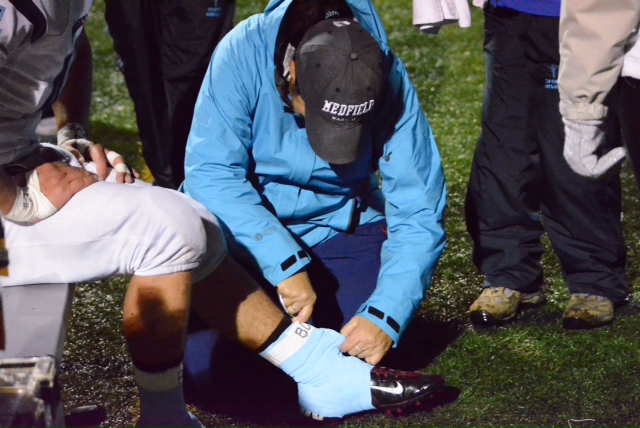May 21, 2018High School Challenges

I love being an athletic trainer. After I spent 30 years at the NCAA Division I level, being at the high school is a refreshing and much less stressful position. Every high school athletic trainer in a smaller town knows they are like the mayor. Everyone knows you and says hello, and you may not always know who they are.
I have been at Medfield (Mass.) High School for 11 years now. It’s a very good high school about 25 miles outside of Boston. It’s a small community that places a high emphasis on sports and academics, and there are just under 1,000 students at my school.
I have a great situation in that my athletic director is a former athletic trainer, and my principal and superintendent both played sports in college. Therefore, I am very supported by the administration, as well as the parents and town. My budget is more than adequate.
Despite the good things about being a high school athletic trainer, there are challenges, too. I won’t lie, the transition to the high school level was difficult my first year.
In addition, I have a great relationship with our nurses. I meet with them every day, and we support each other. I take care of all orthopedic injuries, and they take care of the illnesses and medications. We run the concussion program at the school together and have our return-to-play and academic accommodations worked out. We attend the annual concussion seminar that Children’s Hospital in Boston hosts every year.
At the high school level, the coaches’ jobs are not usually dependent on their win/loss record. The coaches are teachers for the most part and know how to progress athletes physically and mentally throughout the season.
The student-athletes at the high school level are great. The types of injuries I often see include avulsion fractures of the anterior superior iliac spine, Osgood-Schlatter disease, Sever’s disease, and sacroiliac joint and patella tendon issues. Also, many athletes play several sports at a time and some specialize way too much. I see this in their injuries.
However, despite the good things about being a high school athletic trainer, there are challenges, too. I won’t lie, the transition to the high school level was difficult my first year. The injuries are different, and the growth spurts of the boys sometimes cause issues.
Further, some of the other athletic trainers in my league don’t have supportive administrations. Their bosses don’t understand the nature of our jobs and the liability and value of the athletic trainer as a health care professional.
I see this sometimes in the way sports medicine coverage is handled at football games. Recently, I had a fight with the referee at our playoff game. I called ahead of time and asked if the visiting team’s athletic trainer would be in attendance at the game we were hosting, and I was informed yes. My athletic director also called and was told an athletic trainer would be there.
Game time came, and there was no athletic trainer. At one point, the referee stopped the game and told me someone was hurt on the other team. I told him I was not going over to the other sideline to check the player. The referee was dumbfounded and told me I took a Hippocratic oath and had to go. I informed him that since I am not a doctor, I didn’t take that oath and don’t have to go. The visiting team said they were bringing an athletic trainer and didn’t even have the courtesy to ask me if I would cover for them.
I am pushing for a rule in Massachusetts to make it mandatory for all football teams to have an athletic trainer on the sidelines for home and away games. If you can’t afford it, don’t have a team. You don’t expect a home team’s coach to coach a visiting team, so don’t expect a home team’s athletic trainer to cover both teams. What is the liability? Who pays if we get sued? What if the coach doesn’t listen to me? I am not taking that risk. I hope all athletic trainers put their foot down and refuse this absurd and stupid practice.
The last area of concern at the high school level is the clinical athletic trainer who is not on a teacher’s contract. If you work for a clinic and the clinic won’t give you 40 hours a week at the school, you might have to work in the physical therapy department. But because we can’t bill, you get sucked into doing menial jobs like filing or other non-allied health work. This is one reason why we need to be able to bill for our services.
The high school athletic trainer is a very valuable resource to their school and town and prevents liability that many schools don’t even realize. It is a great job, but you have to be able to fight for what you need, including a fair job and salary.



